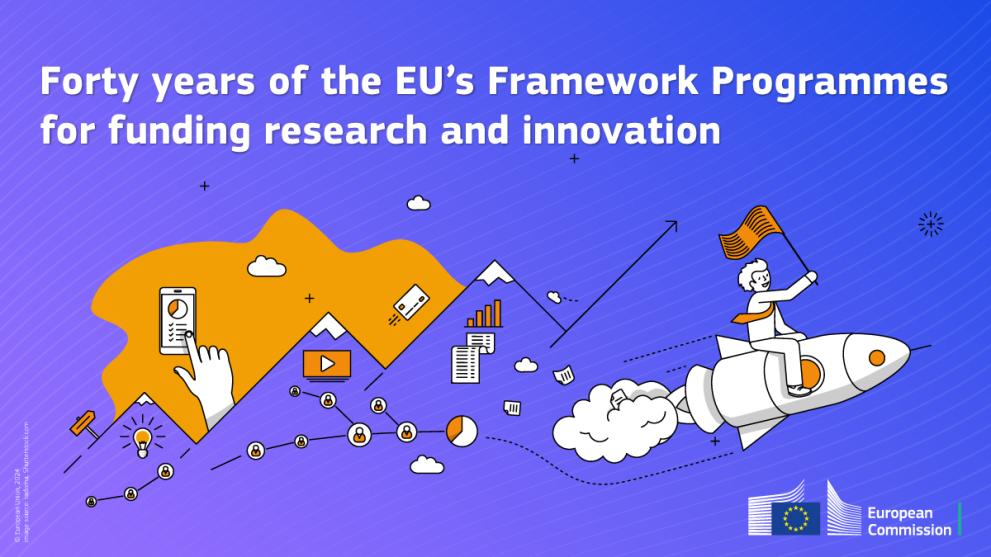
This year, we celebrate forty years of the EU’s Framework Programmes for funding research and innovation.
Over these forty years, the EU has funded life-changing research - including support to countless projects and researchers. To help manage these projects and implement its innovation policy, the EU established the European Research Executive Agency (REA) in 2007.
Since then, REA has managed over 31,000 projects totalling over €30 billion in EU commitments – with new projects added to its portfolio every year!
The past achievements will be celebrated at this year’s European Research and Innovation Days - with lessons learned helping to build a greener, fairer, and more competitive Europe. Read how REA supports the EU’s research and innovation policy with some highlights below.
The Nobel Prize and the Marie Skłodowska-Curie Actions
Through support for researcher’s mobility as well as doctoral and postdoctoral training, REA has backed 18 recipients of the Nobel Prize. We had the chance to interview one of the 2023 Nobel Laureates in Physics, Dr. Anne L’Huillier, who discussed the “crucial” EU funding she received early in her career. Read REA's interview with Dr. Anne L’Huillier
Seven projects that support the EU’s priorities
From democracy to digitalisation; the research conducted by these projects will feed into policy for the benefit of citizens.
Building a climate-neutral, green, fair and social Europe
The CLAIM project developed innovative methods for cleaning both visible and invisible marine litter. Research targeted ocean litter in “all its forms” with multiple methods; from preventing litter from entering the sea to filters on-board ships. Read more about this Success Story
Airborne pollutants affect everyone’s health. That is why the VIDIS project produced novel low-cost sensors to monitor air quality, which will allow for more frequent monitoring while avoiding large and expensive sensors. It also initiated the VIDIS Centre, an internationally recognised hub for research and innovation in air quality monitoring. Read more about this Success Story.
BRIDGE-BS will assess the current environmental state of the Black Sea. It will use an inter-disciplinary method to factor stressors (such as pollutants, over-fishing, and anthropogenic pressure) and ensure the sustainable management of the Sea’s eco-systems.
Developing a strong and vibrant economic base
“Big Data for smart society” - that is the mantra of the GATE project, which works to translate scientific knowledge into societal and policy applications. The project also established the GATE Centre of Excellence, Bulgaria’s first for Big Data and Artificial Intelligence research, providing innovative solutions at both the regional and European levels. Read more about the GATE Centre of Excellence
Protecting citizens and freedoms
In times of crisis, the first to arrive on the scene are emergency-responders. The ASSISTANCE project developed and tested various data-gathering devices to improve responders’ situational awareness, improving responders’ safety, allowing for more efficient responses, and protecting more lives. Read more about this Success Story
Unfortunately, Gender-based Violence (GBV) also occurs at research institutes. Two projects, UniSAFE and GenderSAFE, are working on improving knowledge on GBV’s occurrence. From this, they will work on recommendations to improve safety, inclusivity, and protections for victims.
Promoting European interests and values on the global stage
As part of the Global Gateway, the ENRICH in Africa project contributes to the implementation of the AU-EU Innovation Agenda. It brings innovators from Europe and Africa together in an online marketplace, which offers the possibility for trainings. Joint start-ups are already winning awards and the EiA Centre in Cape Town is fostering cooperation. Read more about this Success Story.
Check out REA’s website for regular updates on research that supports the EU’s priorities.
What are the EU’s Framework Programmes?
As part of its budget, the EU funds various scientific actions and activities through its Framework Programme for funding research and innovation. These mimic the EU’s budget-cycle, usually running on a seven-year basis. The first was established in 1983. Horizon 2020 ran from 2014 to 2020.
The current Framework Programme is Horizon Europe, the world’s largest programme for research in the world. Running from 2021 to 2017 and with a budget of €95.5 billion, it extends beyond EU member states. Horizon Europe Association Agreements have been concluded (to varying degrees) with countries across the globe; from Iceland to New Zealand.
Discussions have also already commenced on the next Framework Programme.
Details
- Publication date
- 18 March 2024
- Author
- European Research Executive Agency
